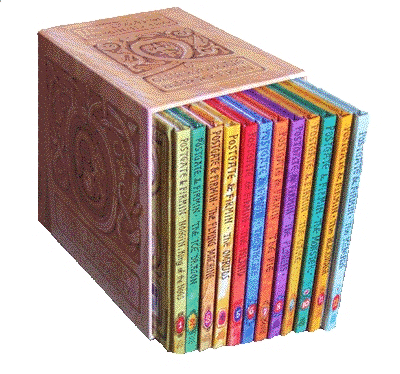If all the biographies I have ever read were vertically stacked atop each other, the resulting structure would be far from an impediment to even very low-flying aircraft, or, for that matter, most wasps. This lack of engagement with the genre may be to do with my Reality allergy, or may be the result of a more amorphous blend of aesthetic and intellectual proclivities. I'm hoping it's the latter. Whatever the reason, I was recently reminded of a book of this class which I had not only read but which also gave me an enormous amount of pleasure, namely Seeing Things, the autobiography of the remarkable Oliver Postgate.
Along with legions of others of all ages, I had been charmed, beguiled and not infrequently disturbed by Postgate's (and his partner Peter Firmin's) menagerie of whistling, knitted aliens, soporific talking cats and, of course, their own characteristic interpretation of Norse history and legend, namely Noggin and the Nogs Knowing nothing about Postgate the person, the biography was a gradual, warming affirmation of a sensitive, ingenious human being who bore vicissitude with courageous stoicism, espoused all that is admirable in humanity and whose creative energies, sometimes diverted by restrained resources and facilities into wondrously ingenious channels, refused to be stifled.
I was reminded of this book last week as I worked (never was a verb less appropriate) my way through a delicious boxed set of Noggin the Nog books. These 12 books, beautifully produced and illustrated, are charming fables in which characters and themes recur in a variety of 'Nordic' settings and themes, from The Hot Water Valley to the mechanical Island, from prejudice and fear to the misuse of technology. There is a great deal of pleasure to be had in Postgate's putting the Vikings through a blender set on 'whimsy' (the foremost warrior, for example, Thor Nogson, is often strongly drawn towards discretion rather than valour), but there are also lovely jokes:
'With a crash and a slop like barrels of water breaking on the roof, the barrels of water on the roof broke asunder'
wonderful imaginary proper nouns, such as Troldeskow and Graculus, and delightful variations on well-known stories and legends.
Without over-egging the Nog, I can't help but think that Olaf, the ingenious court inventor who is constantly threatening the end of civilisation through the development of unpredictable machines, is Postgate wryly observing his own insatiable desire to create brilliant television out of two pipe-cleaners and a reel of Sellotape, while the ever-present Nogbad the Bad, lurking like an unpleasant odour in each tale, is a reminder that evil is never far from even the most innocent-seeming scenario (or even interwoven into it - Nogbad is, after all, Noggin's uncle). To end on a jollier note, however, why not visit the lovely Dragons' Friendly Society website, and order the books.

labalab order dhanywad parmeshwar mera kam adbhut riti se parmeshwar ki daya se chala hi Apna Showroom Baby Kids T-Shirts for Baby Boys & Girls 12-18 months 1 years shirts baby girls boys
ReplyDeleteApna Showroom Baby Kids T-Shirts for Baby Boys & Girls 6-12 months 1 years shirts baby girls boys
Apna Showroom Golden Brass Panchdeep Diya for 5 Cotton Wicks with Wooden Holder - Decorative Brass Diya for Spiritual Ceremonies, Home Decor - Gift for Diwali, Navratri Festivals & Religious Occasions
ab main fir se sab kuch kar rha hu .. investing trading own business real estate